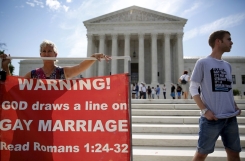
It was widely reported this week that the Southern Bapitst Convention's flagship college, the highly respected Baylor University in Waco, Texas, had removed a ban on "homosexual acts" from its sexual conduct policy. One news outlet even said: "Homosexual acts now OK at Baylor University."
Christian Today reported the story much more circumspectly, I'm glad to say, but it turns out that the story is even more complicated than that. Baylor University is a conservative institution which didn't even lift a ban on dancing until the 1990s and still retains a ban on alcohol on campus. The idea that it would become a hotbed of California-style liberalism was always hard to swallow, and one can only imagine the horror in its hallowed halls at the headlines.
The original story was that Baylor had dropped a specific reference to homosexual acts from its revised sexual conduct policy, which had previously listed them alongside sexual abuse, sexual harassment, sexual assault, incest, fornication and adultery. The new policy says: "Baylor will be guided by the biblical understanding that human sexuality is a gift from God and that physical sexual intimacy is to be expressed in the context of marital fidelity.
"Thus, it is expected that Baylor students, faculty and staff will engage in behaviors consistent with this understanding of human sexuality."
It also says: "This policy will be interpreted by the University in a manner consistent with the Baptist Faith and Message of 1963." That's quite interesting, as unlike the BFM revision in 2000 – which was much more conservative – BFM 1963 makes no mention of homosexuality, though it does define marriage as "the uniting of one man and one woman in covenant commitment for a lifetime".
However, this is a long way from headlines like "Gay sex good to go at Baylor" or "Baylor says yay for gays".
And as an excellent Christian Post article makes clear, the college is adamant that its new guidelines have to be interpreted in the context of its overall understanding of sexuality.
This says: "Christian churches across the ages and around the world have affirmed purity in singleness and fidelity in marriage between a man and a woman as the biblical norm. Temptations to deviate from this norm include both heterosexual sex outside of marriage and homosexual behavior. It is thus expected that Baylor students will not participate in advocacy groups which promote understandings of sexuality that are contrary to biblical teaching."
In a statement provided to CP, Baylor spokeswoman Lori Fogleman said: "Several years ago, an organized effort to review and keep current Baylor's policies began to ensure that the university has the necessary policies and processes in place to comply with the many legal and ethical mandates to which universities are subject as institutions.
"A review of the sexual conduct policy had been contemplated over the last couple of years. These changes were made because we didn't believe the language reflected Baylor's caring community."
The new language, she said, "states more plainly the expectations of the university".
So what happens when someone falls foul of the rules? Judging by the University's disciplinary policy, exactly the same for homosexual as heterosexual misconduct, with a range of sanctions from a verbal warning to expulsion. It also says, however, that in all disciplinary procedures it will "seek to be redemptive in the lives of the individuals involved and to witness to the high moral standards of the Christian faith".
However, the elephant in Baylor's room – as it is in other Christian colleges – is same-sex marriage, now declared to be constitutional by the US Supreme Court. The trouble is not that they will be forced to extend their definition of marriage to same-sex couples – offering housing to gay couples on the same terms as heterosexual, for example – but that the Internal Revenue Service might withdraw their tax-exempt status if they fail to do so, on the grounds that they are violating a "fundamental national public policy".
The move would be based on a 1983 Supreme Court decision which allowed the IRS to revoke the tax-exempt status of colleges which still banned inter-racial relationships (it was Bob Jones University). In a letter before the court's ruling on gay marriage, the heads of more than 70 Christian institutions – though Baylor was not among them – wrote to congressional leaders saying: "Any federal initiative, whether generated in the judicial, executive, or legislative branches of government, to remove tax-exempt status from faith-based educational institutions because of their commitment to their beliefs about marriage would result in severe financial distress for those institutions and their millions of students." It warned that any such move would "constitute a devastating and dangerous blow to free religious belief and practice".
America is a notoriously litigious nation and it is only a matter of time before the issue is tested in the courts. In the meantime, a government Non-Discrimination Act aimed at preventing employers discriminating against LBGT people but which would also provide cover for religious institutions is making a tortuous way through the legislative process. The 70 college signatories urge support for it, but it is being held up in Congress precisely because of the collision of values implicit in what it is trying to do.
Baylor's sexual conduct policy made for some amusingly overstated headlines, but it's hard to overstate the significance of the issues that lie ahead for conservative faith-based institutions, which may be faced with having to conform to the new morality or die.

















